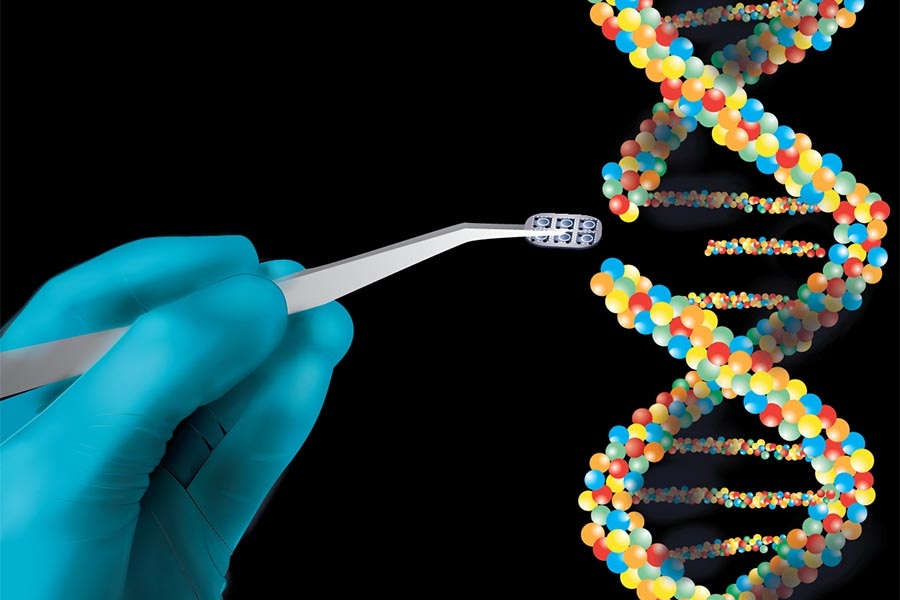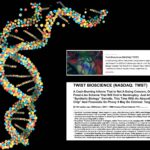Here’s what you need to know.
WHAT’S TWIST AGAIN?
Founded in 2013 by Emily Leproust, Bill Banyai, and Bill Peck, Twist Bioscience is a public biotechnology company based in South San Francisco that manufactures synthetic DNA for customers in a wide range of research and development fields related to the life-sciences sector.
On January 12, 2021, Twist announced Wilsonville as the site of its new “factory of the future” — a state-of-the-art DNA-manufacturing facility that would use Twist’s proprietary technology to grow synthetic DNA at a rate that far outpaced competitors.
WHAT DOES TWIST DO?
Twist’s core business is gene synthesis — manufacturing synthetic DNA strands called oligonucleotides. Synthetic and molecular biology labs need high volumes of synthetic DNA so they can create thousands of sequence variants at once. As such, they are widely purchased by research institutions.
WHAT ARE OLIGONUCLEOTIDES?
Oligonucleotides are strands of synthetic DNA or RNA that serve as a base for many molecular biology and synthetic biology applications. Oligonucleotides are most commonly used by researchers to create a polymerase chain reaction, which can generate thousands or millions of copies of a particular DNA strand using synthetic DNA as a primer.
Oligonucleotides are made using a repetitive, four-step process in which the four nucleic acids are added one by one to a cellular building block called a phosphoramidite.
The process for synthesizing oligonucleotides was developed in 1981 and still has room for innovation. During synthesis, shorter chains or failure sequences can emerge, which disrupt and compete with the main sequence. While automation technology has improved the manufacturing process, oligonucleotides are still relegated to relatively small-scale operations due to the hardware necessary for automation and miniaturization.
Recent advancements in the field of DNA manufacturing have come from controlling the plate upon which the oligonucleotides are grown. U.K.-based Evonetix uses a proprietary semiconductor chip in place of plastic plates to create islands of independently controlled temperatures on the plate, effectively controlling what spots on the plate the DNA strand can develop. Switzerland-based Bachem has built synthesizers able to adjust the nucleic acid portions in real time during the synthesis process, which helps control for competing offshoot DNA strands.
WHAT’S TWIST DOING WITH OLIGONUCLEOTIDES?
Twist says it can generate oligonucleotides more efficiently than its competition. Its ability to do so relies on a proprietary silicon chip, similar to Evonetix, that acts as a plate upon which synthesis process occurs — referred to as “a lab on a chip.”
Silicon is flat at microscopic scales, meaning the fluids required for the chemical reaction flow uniformly across its surface, and materials can be added or removed during the process without changing the surface.
Twist says the efficiency of its proprietary silicon-chip method generates 1,000 times higher throughput than the conventional process at a significantly lower cost than competitors using traditional plastic plates for DNA synthesis.
SO DOES IT WORK?
It depends who you ask: read our full story, “Twist and Short,” for a deep dive on the competing claims about Twist’s technology.
A former director-level employee quoted in this fall’s report from Scorpion Capital says the company’s chip does little to help in the synthesis process, and in fact makes Twist’s oligonucleotide generation method more costly, time-consuming and labor-intensive. Other Twist employees quoted in the report said incorporating the chip didn’t make Twist’s workflow more efficient — and, in fact, created bottlenecks.
A former director-level employee claims the enormous capacity of the silicon chips means Twist must wait to fill multiple orders at once to remain cost-efficient. They compared Twist’s lab on a chip to building a plane that’s a thousand times larger than a typical one, only to spend days at the airport gathering passengers to recoup the costs of fuel and labor.
Leproust begs to differ. She has said the claims in the Scorpion report were “wild misunderstandings” of how Twist’s silicon chip manufacturing process works, but also says she is not able to publicly say how Twist’s proprietary method generated synthetic DNA.
— Sander Gusinow




